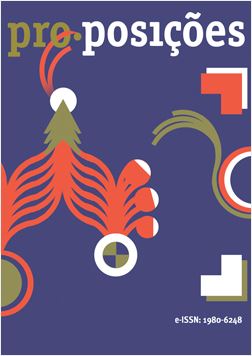Abstract
This article proposes a reflection on the methodological dimension in the organization of pedagogical work, resuming the debate on the constitution of the class and the place of the teacher-student-knowledge triad in the process. Mobilized by the report of a 4th grade teacher, it seeks about the place and role of methodological choices in the organization of teaching pedagogical work, assuming them as constitutive of the dialectic pair content/form. Far from presenting proposals or extolling the reported experience, the text seeks to problematize the contours that shape the methodological decisions of the class as a necessary reflection for the delimitation of teaching action, within the potentiality of what is conventionally called the creative unfinished teacher, inspired by Freire (1996). It is argued that by assuming critical conceptions, the teacher is invited to lead, with his students, a construction process that requires the opening to the unexpected possible which, unaware of the way, must be clear of destiny, opening up by the dynamics of the event. the multiple learning in the constant experience of new ways of walking, firmly grounded in principles and contents.
References
Almeida, L. C. (2017). A Didática na formação de professores: espaço e contribuição. In S. A. Siquelli, J. L. Sanfelice, & L. C. Almeida (Orgs.), Fundamentos da educação: compreensões e contribuições (vol. 1, pp. 177-194). Navegando Publicações.
Freire, P. (1996). Pedagogia da autonomia: saberes necessários à prática educativa (23ª ed.). Paz e Terra.
Freitas, L. C. (1995). Crítica da organização do trabalho pedagógico e da Didática (7ª ed.). Papirus.
Imbernón, F. (2011). Formação docente e profissional: formar-se para a mudança e a incerteza (9.ª ed.). Cortez.
Mello, T. (2009) A vida verdadeira. In T. Mello, Melhores poemas de Thiago de Mello (Marcos Frederico Krüger, Sel.). Global.
Paro, V. (2007). Qualidade do ensino: a contribuição dos pais (3.ª ed.). Xamã.
Pino, A. (2004, set./dez.). Ensinar-aprender em situação escolar: Perspectiva histórico-cultural. Contrapontos, 4(3), 439-460.
Sanfelice, J. L. (2014). Sala de aula: intervenção no real. In R. Moraes (Org.), Sala de aula: que espaço é esse? (22.ª ed.). Papirus.
Saviani, D. (2009). Escola e democracia: teorias da educação; curvatura da vara, onze teses sobre a educação política (41ª ed.). Editores Associados.
Shulman, L. (2005). Conocimiento y enseñanza: fundamentos de la nueva reforma. Revista de Currículum y Formacíon del Profesorado, 9(2), 1-30. http://www.ugr.es/local/recfpro/Rev92ART1.pdf
Smolka, A. L. B. (2008). A criança na fase inicial da escrita: a alfabetização como processo discursivo (12.ª ed.). Cortez.
Smolka, A. L. B., & Laplane, A. L. F. (1993). O trabalho em sala de aula: Teorias para quê? Cadernos ESSE, 1(1), 79-82.
Snyders, G. (1996). Alunos felizes: reflexões sobre a alegria na escola a partir de textos iterários (2.ª ed.). Paz e Terra.
Veiga, I. P. A. (2008). Organização didática da aula: um projeto colaborativo de ação imediata. In I. P. A. Veiga, Aula: gênese, dimensões, princípios e práticas Papirus.

This work is licensed under a Creative Commons Attribution 4.0 International License.
Copyright (c) 2022 Pro-Posições


